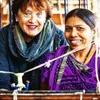From artisans to entrepreneurs: how social initiative Antaran is reviving the lives of handloom weavers in India
Across India, Antaran is providing end-to-end support to artisans by enabling them with computer and communication skills, basic design thinking, and helping them register their companies.
Akula Charan Nandi, a handloom artisan from Maniabandha, Odantisha, used to work for the master weaver by weaving clothes and selling them through the middlemen in the village market. However, this was not enough to sustain his family of nine as the 45-year-old managed to earn only Rs 15,000 per month.
With time, Akula realised that he needs to learn more than just weaving to support his family. Also, he wanted his own business, designing kurtas and sarees. But he wasn’t able to find someone to guide him.

Akula Charan Nandi interacting a Jaya Jaitly
Then, he came across Antaran, a Tata Trust initiative that aims to help local artisans and bring them to the domestic and export markets by helping them build their own businesses.
The dilemma
The Indian craft sector alone provides employment to over seven million families, second only to the agricultural sector.
But over the years, artisans are being crippled thanks to automation and advance manufacturing methods that can mass-produce the same items and sell at a lower cost. In addition, native artisans from the rural regions of states like Odisha, Assam, West Bengal, and other eastern and north-eastern parts don’t have access to domestic and export markets.
Northeast India constitutes to around 55 percent of the total handloom weaver population, but products are limited to domestic purposes and occasions in the absence of access to the larger market.
The moment of change
Faced by the same problems, Akula joined Antaran in mid-2018. In a conversation with SocialStory, he says,
“I learnt more than just designing. I learnt about colour combination, weaving different types of clothes, how to engage with my customers, and how to operate a business on my own. Now, I can not only weave sarees, but also kurtas, dupattas, and other clothes as well.”
Eventually, with the help of the Antaran initiative, this February, he started his own handloom company, Triratna Handloom Kraft in Cuttack, Odisha. Since then, he has been selling his products to markets in Chennai and Mumbai.

Akula during a Antaran learning session
He adds,
“I knew that to sell my products, I have to get a GST registration and so I did. I am now planning to expand my operations by accepting huge orders from customers directly.”
By the end of June, Akula’s business had a turnover of Rs 8 lakh. At present, he has 15 employees, including his younger brother.
It’s not just Akula. Thanks to Tata Trusts’ Antaran, hundreds of artisans are now learning business and handloom skills like designing and machining, etc. Its craft-based livelihood programme is reaching out to over 200 artisans in the states like Assam, Nagaland, and Odisha.
Bridging the gaps
In the north eastern states alone, women weavers constitute over 99 percent of the total weaver population. In the absence of proper guidance and support, these women were not able to tap into or understand the market where they could sell their products. Sharda Gautam, Head of the Crafts, Tata Trusts, tells SocialStory how an initiative like Antaran can empower artisans in the rural sector:
“If you look into the north eastern states, there is an abundance of skilled designers and craftsmen as handloom is a major source of livelihood for them. Moreover, these craftsmen are disconnected from the market. Hence, most of their products are limited to their own needs, like festive seasons and usual outfits.”
Antaran is aiming to rejuvenate them by providing end-to-end support through their programme. Artisans are taught computer and communication skills, basic design thinking, etc. Additionally, the initiative helps them set up their businesses and register their companies.
1565102961502.jpg?fm=png&auto=format)
Weavers are educated through Antaran initiative and are further helped to become an entrepreneur
So far, three clusters have been chosen, one each from Odisha, Assam, and Nagaland. These cluster of artisans will be transformed into entrepreneurs who would eventually lead microenterprises on their own.
According to Sharda, in Odisha alone, there are around 1,000 weavers who are being taken into consideration under the initiative.
The way ahead
Sharda says that designers and weavers in the western region of the country are quite successful when compared to the northeastern states, which is why the initiative chose this region.
During its five-year programme, Antaran will also help the artisans acquire different skill sets like machining, colour combination, business strategy, and weaving.
Sharda says that there are three types of artisans. One, the kalakar or the entrepreneurial artisans who know the business and have relative skills to understand the customer’s need. Second is the karigar who isn’t well-versed with advanced manufacturing techniques but have handloom weaving skills. The third type is the majdoor or the labourer who does not possess any skills but act as a support to the first two types.

Representational image
The Antaran initiative also includes setting up incubation centres to educate the first two categories of artisans. These are being opened in Maniabandha village of Cuttack district (Odisha), Bhagawatipara village of Kamrup district (Assam), and 5th Mile of Dimapur district (Nagaland).
As stated by Sharda, at the end of the fifth year of the programme, the projected annual turnover of an artisan-turned-entrepreneur would be between Rs 45 lakh and Rs 50 lakh.
Keeping the conditions and timings of the artisans, classes are held from 6 pm to 9 pm in Odisha, whereas classes in Nagaland and Assam are held in the morning when most of the women are free after their kids and husbands set out for school and work.
In time, Antaran aims to have kalakars associated with karigars and majdoors to run their businesses.
The next step is to inculcate a number of artisans from different states and educate them. Sharda says, in coming months, Antaran is opening three incubation design centres in Odisha, Assam, and Andhra Pradesh.
Further, the plan is to develop six similar clusters and educate over 3,000 artisans of which, 300 artisans would come from Andhra Pradesh alone.
(Edited by Saheli Sen Gupta)



1553156987557.png?fm=png&auto=format&h=100&w=100&crop=entropy&fit=crop)





